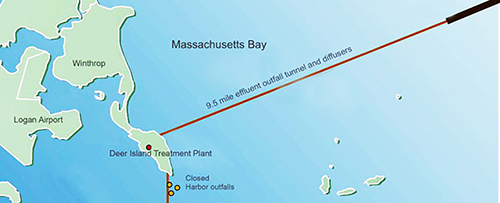| Home |
| Water System |
| Sewer System |
| Harbor and Bay |
| School Program |
| About MWRA |
| Doing Business with MWRA |
| Contact MWRA |
Boston Harbor
and Massachusetts Bay
Massachusetts
Water Resources Authority
Regulatory Reporting |
Archive |
Regulatory Reporting
| Because the Massachusetts Water Resources Authority discharges effluent from the Deer Island Wastewater Treatment Plant into Mass. Bay, it has been granted a federal National Pollutant Discharge Elimination System (NPDES) discharge permit by its regulators, the U.S. Environmental Protection Agency (EPA) and the Massachusetts Department of Environmental Protection (DEP). To ensure the protection of the receiving waters in Massachusetts and Cape Cod Bays, the permit includes monitoring requirements, pollution prevention measures, and a Contingency Plan to ensure that unexpected problems are swiftly detected and resolved. MWRA is required to post many monitoring results online. |
|---|

| WHAT'S NEW | AMBIENT MONITORING |
| MWRA posts recent treatment plant performance and environmental quality reports on the What's New page. Many of these are required by the NPDES discharge permit. |
MWRA measures environmental conditions in the Bays such as nutrients, metals, and algae blooms. Monitoring results are compared with pre-discharge baseline data, to help assess any impact of the discharge. |
| CONTINGENCY PLAN | BEST MANAGEMENT PRACTICES |
| The Contingency Plan in the NPDES permit sets out thresholds for environmental monitoring. A Caution or Warning level exceedance requires further research to detect any potential harm to Mass. Bay from treatment plant discharges. The annual Outfall Monitoring Overview compares
monitoring results
with these thresholds. |
MWRA implements a best management practices plan to minimize contamination in runoff from the Deer Island Treatment Plant, headworks stations, Combined Sewer Overflow treatment facilities, and sludge pelletizing plant. |
| DISCHARGE NOTIFICATIONS | DISCHARGE MONITORING |
State regulations require MWRA to notify the public when certain events occur that result in untreated or partially treated wastewater being released into surface water--a river or stream, lake, or ocean. Notifications are posted online and also sent out via email and text. All Data is preliminary and subject to change. |
MWRA monitors the effluent discharged into Massachusetts
Bay by the Deer Island Treatment Plant for a wide range of pollutants, and reports the results monthly to state and federal regulators.
All monitoring data is made available to the public. Reports include monthly Discharge Monitoring Reports for Treatment Plant and CSO facilities. (PDF) |
| DEMAND MANAGEMENT | GROUNDWATER REMEDIATION |
| MWRA is subject to an average dry day flow limitation of 436 million gallons per day. This annual report assesses the effectiveness of demand management programs and water conservation efforts done by communities in the service area, to keep flow within limits. |
MWRA
prohibits discharges into the MWRA system for groundwater
remediation activities. Any proposed changes to this rule must be posted online. There are currently no proposed changes. |
| LOCAL LIMITS | OPERATIONS & MAINTENANCE |
| MWRA regulates discharges from certain business or industrial sewer users and prescribes limits for both the quantity and quality of discharged substances. MWRA must develop and enforce these limits to prevent pollutants from causing problems with permit compliance or system operations. |
MWRA routinely maintains the sewage treatment and sludge pelletizing plants and submits to regulators annual status reports and a report on infiltration/inflow reduction efforts. MWRA also must report when there is an operational incident or upset at an MWRA facility. |
| OUTFALL MONITORING SCIENCE ADVISORY PANEL | |
| The Outfall Monitoring Science Advisory Panel (OMSAP) advises the US Environmental Protection Agency (EPA) and DEP on scientific and technical matters related to MWRA's bay outfall and any potential impacts of the discharge on its receiving waters. Materials from OMSAP Meetings are available online. |
• Pollution Prevention Plan: addresses the quality of wastewater before it enters MWRA's sewerage system. |
| PRIOR NOTICE | ARCHIVE |
| MWRA must provide at least a 30-day prior notice of any significant change in the volume or character of pollutants being introduced into the treatment plant that may cause the discharge to exceed water quality standards in the receiving water.
| The Archive page provides access to past environmental quality reports. |